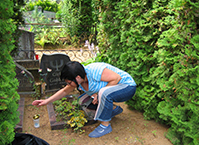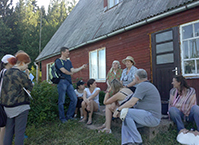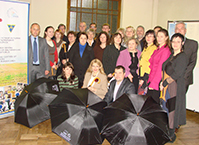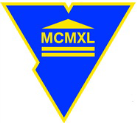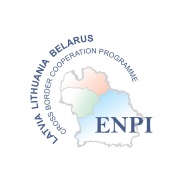E-MUSEUM “VITAMEMORIAE”: COLLECTION AND RESEARCH
Foto
To record people’s life stories, traditions, customs, rituals, rare photographs, old documents, ethnographic differences in funeral rites, etc. the researchers of Daugavpils University and Yanka Kupala Grodno State University carried out field studies in LV and BY territories: in the villages of Krāslava, Rēzekne, Daugavpils regions (Asūne, Foļvarka, Kruki, Skrudaliena, Indra, etc.) and in Belarus (Braslav and Vitebsk districts). The field studies were implemented in the framework of the project “Popularization of the Centres of Oral History in the LV – BY Cross-Border Area”, ID Nr. LLB–2–143, of the Cross Border Cooperation Programme Latvia–Lithuania–Belarus implemented within the framework of the European Neighbourhood and Partnership Instrument 2007–2013.
During the research and the expeditions, the project implementers collected, segmented, transcribed, and digitized the audio-visual materials (audio and video records, photo evidence). To make the collection of the E-Museum more complete, the field researchers and cemetery researchers of Daugavpils University and Grodno University will segment and systematize the audio-visual materials collected during oral history, cemetery research, folklore and dialectology expeditions of the previous years that until now have not been used, aiming at including the best and most valuable segments of the collection into the E-Museum.
The story tellers whose life stories make the input of the E-Museum are people of various generations, mostly elderly people. The childhood of aged people, who at present are about 80 years old, proceeded in the 1930s, therefore the segmented audio-visual units included in the E-Museum chronologically begin from 1929 and can describe only the respondents’ childhood memories. The memory of the older generation is particularly important for the anthropological and historical research – it shifts the time borders, allows for moving to the events of the past through the viewpoints of those who have experienced those times. The facts can be found in chronicles, but what the witnesses of that time can reveal give the memories colour, scent, involve one into mutual emotional experience. The witnesses of the epoch tell about the events form the viewpoint of their own experience.
To motivate the respondents to share their life stories, the project field researchers used Paul Thomson’s oral history research method – enlarged vision of social history where diverse groups of the society are brought together and share common historical experience.
The research basis is the methodology of a semi-structured interview that envisages focused (guided) reconstruction of the past events and an interviewer only helps the respondents to reconstruct the past.
The oral history collection of the E-Museum is envisaged to be used not only by specialists but also by a greatest possible range of non-specialists, therefore, departing from the academic tradition envisaging a complete script and transcript (written transcription of an audio or video record) of life stories, the project experts agreed to segment 360 most vivid, colourful, expressive, unusual, typological or extraordinary audio-visual units (photo, video and audio testimonies) – thematically complete excerpts, and to systematize them according to the thematic plan that would encompass both the historical processes of the 20th century (from the 1920s-30s) and the most essential events of an individual’s life.
ACCESSIBILITY OF THE COLLECTION
The interviews included into the collection are arranged according to the principle of historicism, anthropologism and personalia, indicating the author’s name and the interviewer’s name and surname.
-
About parties, studies, wedding and husband
Story-teller: “In Rogovka. You know, I finished the pharmacists’ school, my mother was a strict, old-fashioned person, she did not let me go anywhere. There were no parties in Rogovka, …
Researcher: Dr. philol. Gatis Ozoliņš, Daugavpils Universitāte
Categories: Holidays and traditions, Antonina Melne
-
Аbout development of a profession and work
Story-teller: “At those times those holidays were not so celebrated. Līgo [Midsummer night festivities], school finishing, I finished the secondary school in Rogovka, I was born and grew up …
Researcher: Dr. philol. Gatis Ozoliņš, Daugavpils Universitāte
Categories: Study and work, Antonina Melne
-
Аbout export to Siberia
Story-teller: “I grew up alone, the herds tended grazing cattle, we had even four cows. The pasture was far away. About a kilometre in that direction. I wasn’t allowed to go anywhere!& …
Researcher: Dr. philol. Gatis Ozoliņš, Daugavpils Universitāte
Categories: Family, Antonina Melne
-
Hunger in Latgale after World War II
Story-teller: “Yes, I remember, the year forty-seven, that was the year when we ran short of bread already in spring. We both with my father went to Zemgale, The sister’s brother lived in …
Researcher: Dr. philol. Gatis Ozoliņš, Daugavpils Universitāte
Categories: Holidays and traditions, Andrey Rancan
-
The guerrillas and The Legionaries
“They were called up for the legion. They came for the leave, and did not return to the front, stayed here, those were those forest brothers. But then they stayed in the woods, and when the …
Researcher: Dr. philol. Gatis Ozoliņš, Daugavpils Universitāte
Categories: End of the war, Andrey Rancan
-
About spending evenings together and parties
Story-teller: “Winter, that was the fasting time, somehow or what, we went to spend evenings together, that was called vakarēšana [spending evenings together]. The whole lot, maybe they …
Researcher: Dr. philol. Gatis Ozoliņš, Daugavpils Universitāte
Categories: Mode of life, Andrey Rancan
-
Soviet repressions and service in a legion
Story-teller: “The legion…Only from my neighbourhood there were three volunteers who had joined it.”
Interviewer: “Did they volunteer themselves?”
Story-teller: & …
Researcher: Dr. philol. Gatis Ozoliņš, Daugavpils Universitāte
Categories: Beginning of the war, Andrey Rancan
-
About the sister after the World War II
Story-teller: So, this is how we found her in the end, you see. The war was going on. But here, only, wait, the year forty-fourth, we received the letter in forty-five, we got in on some day in May, …
Researcher: Dr. philol. Gatis Ozoliņš, Daugavpils Universitāte
Categories: Residence and weekdays, Antonina Ludborza
-
About holidays and traditions
Story-teller: “But at the New year … So then, at the New year’s eve we always poured lead [to learn the future]. The youth … We can say, that no year passed and, no New Year& …
Researcher: Dr. philol. Gatis Ozoliņš, Daugavpils Universitāte
Categories: Holidays and traditions, Antonina Ludborza
-
Par augiem
Man jau bērnībā manai vecāku mājai bija māju vārds „Liepas”, līdz ar to liepas kādas 4 milzīgas ap māju auga. No krāšņumaugiem, protams, tie bija ceriņi, jasmīni. No puķēm …
Researcher: Dr. philol. Valentīns Lukaševičs, Daugavpils Universitāte
Categories: Liga Seikste-Deksne, Kolekcija un pētniecība, Latvija, Pirmās bērnības atmiņas, Ģimene, Līga Seiksta-Deksne


